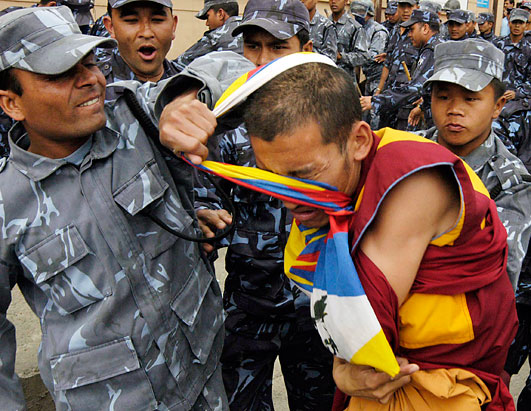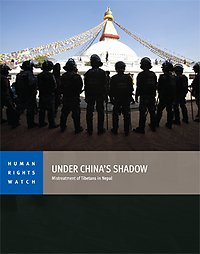Tibetan refugees living in Nepal have been increasingly persecuted by Nepali authorities as a result of heavy pressure from the People’s Republic of China, according to a report from Human Rights Watch (HRW) published on April 1.
Deepening ties between the two nations, the report finds, have led to China’s growing influence on Nepal’s refugee policy and a consequent crackdown on Tibetan exile communities in Nepal. Since the 2008 uprisings in Tibet these communities have faced mounting surveillance, restriction of free assembly and speech, arbitrary arrest and detention, torture, judicial discrimination and forced repatriation to Chinese authorities in Tibet. It is also significantly harder for Tibetan refugees to acquire official identification, severely limiting their ability to obtain employment and education.
In addition, increasing co-operation in border security operations with China has contributed to a drastic reduction in numbers of Tibetans escaping into Nepal. Before 2008, 2,200 refugees a year on average crossed the border into Nepal; in 2013, 173 successfully made the journey.
Nepal, which shares its mountainous northern border with Tibet, has for decades been the first destination for Tibetans fleeing their homeland. Nepal accepted Tibetan refugees until 1989 when its policy changed to forbid the permanent residence of new refugees, and Refugee Certificates (RCs) became hard to acquire. Nonetheless, Nepal has since assured the safe passage of refugees to India according to an informal “Gentleman’s Agreement” with the UN High Commissioner for Refugees (UNHCR). While some refugees have traveled as far as the south of India, and others to the home of the Dalai Lama in Dharamsala, it is estimated that 20,000 refugees have elected to remain in Nepal creating sizeable Tibetan communities in the Kathmandu Valley, Pokhara, Mustang, Namgyaling, and Gyalsa.

Displaying of “Free Tibet” banners and the Tibetan National flag is restricted in Nepal.
Photo: asianews.it
In the years following the 2008 uprisings in Tibet especially, Kathmandu has developed from a centre of Tibetan culture to one of pro-Tibet political activism, creating what China perceives to be a distinct threat to its control of Tibet. This same time period saw China creating much stronger diplomatic and economic relationships with Nepal, becoming the top direct foreign investor in Nepal. HRW analysts allege these actions to be part of a calculated strategy aimed at shifting Nepal’s national interests towards China, giving China greater influence over Nepal’s refugee policy.
China’s success in these aims has been sorely felt in Nepal’s Tibetan communities. As one former Tibetan monk living in Kathmandu stated, “Now I can see Nepal is not safe for Tibetans…The Tibetans here are always afraid.”
The full Human Rights Watch Report may be found at: http://www.hrw.org/reports/2014/04/01/under-china-s-shadow





 Print
Print Email
Email